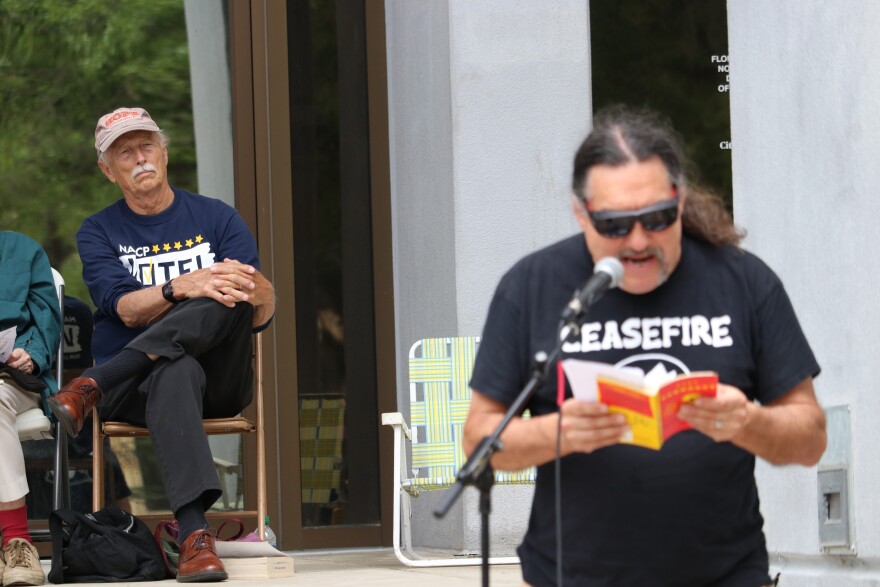In the plaza in front of Gainesville city hall, a crowd of about 100 people came to listen on Sunday afternoon to stories that their children or grandchildren may be barred from hearing in school.
The “Banned Book Read Out,” hosted by the Unitarian Universalist Fellowship Social Justice Council, brought 10 selected people to read out excerpts and poems from books banned or challenged by the Florida state government, or works that have been challenged in the past. Topics included literature exploring African Americans, anti-war themes and the Holocaust. Attendees were also given the chance to take home a banned book.

“I just thought there’d be a gathering of like-minded people here, and I better dart over here to see what they’re reading,” Jim Porter, an attendee of the event, said. “I didn’t realize it was going to be that good.”
Zoharah Simmons, an activist during the Civil Rights Movement and a former UF professor, was the Mistress of Ceremonies for the event. Speakers at the event were primarily well-known figures in the Gainesville educational or social justice community.

“We are here today speaking out against the banning of books that tell the true history of our country and document the experiences of all those who suffered from these oppressions in the past and currently,” Simmons said during the event.
The controversial signing of HB 1069 by Ron DeSantis on May 17, 2023, unleashed a wave of challenges to literary works. The bill restricted instructional content on reproductive health and human sexuality in public school. If broken, teachers could face a variety of penalties ranging from fines to loss of teaching certification to even criminal charges.
Florida led the nation in book titles challenged for restriction or removals, with around 2,700 challenges in 2023, the American Library Association reported in March. Texas comes second in the nation with nearly 1,500 challenges. Alachua County has a list of challenged books in the county on a spreadsheet created by District Media Specialist Patty Duval.
The process to review books is often extensive. When a book is challenged by an individual, the district reviews its content and decides if it should be removed from shelves. If the challenge is not successful at the district level, the challenger can elect for the work to be reviewed by a hearing officer.

HB 1069 received backlash from many Floridians who cite restrictions of titles to be a step backwards in society. Attendees of the event came to show their support of literary freedom and progress.
“I did not think that something as regressive as going back to book bans would be something we’d be experiencing here, especially in Gainesville, and we’re resisting it as much as we can,” Eric Admunson, an attendee of the event, said. “And it should be resisted because it’s a form of repression that’s not acceptable.”
Byron Prugh is a former teacher at Hidden Oak Elementary school, located at 2100 Fort Clarke Blvd. In 2011, more than ten years before the book ban, Prugh left Florida after receiving pushback from parents when teaching certain books and later ended up in Portland, Oregon. One such book was, “Number the Stars,” a fiction novel set in World War II that follows a family risking their lives to save Jewish people from Nazis, and “Roll of Thunder, Hear My Cry,” a novel that explores racial and economic inequalities that African Americans may face.

“I feel much safer as an educator out in Oregon,” Prugh, who attended the event, said. “I have colleagues who are former teachers and current teachers in the school systems here in Florida, and they definitely are worried about the contents of some of their classroom libraries.”
Sherri Admunson is a former librarian who has lived in Gainesville since 1974. She, like many others, sees diversity in literary topics as something that shouldn’t be challenged, but welcomed.
“It’s important for children to hear about all the different ways people live their lives and what a difference it can make in our world,” Admunson said.
In response to such high numbers of challenges in Florida, DeSantis signed HB 1285 on Tuesday. The bill will put a limit on the number of challenges on school materials an individual without a student enrolled in a district can make per year. Still, literary censorship is an ongoing debate in Florida and across the nation.
“We’re robbing people of experience, potential wisdom, strength and the ability to not be shocked and surprised by everything they see when they grow up when we take the books away from the kids,” Porter said.

